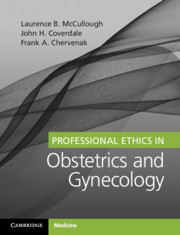Book contents
- Professional Ethics in Obstetrics and Gynecology
- Professional Ethics in Obstetrics and Gynecology
- Copyright page
- Dedication
- Contents
- Preface
- Acknowledgments
- Section 1 Professional Ethics in Obstetrics and Gynecology
- Chapter 1 Professional Ethics in Medicine
- Chapter 2 Professional Ethics in Obstetrics and Gynecology
- Chapter 3 Decision Making By, With, and For Patients
- Chapter 4 Confidentiality
- Chapter 5 Conflicts of Interest and Conflicts of Commitment
- Section 2 Pedagogy of Professional Ethics in Obstetrics and Gynecology
- Section 3 Professionally Responsible Clinical Practice
- Section 4 Professionally Responsible Leadership
- Section 5 Professionally Responsible Innovation and Research
- Section 6 Professionally Responsible Health Policy and Advocacy
- Glossary of Key Concepts
- Index
- References
Chapter 4 - Confidentiality
from Section 1 - Professional Ethics in Obstetrics and Gynecology
Published online by Cambridge University Press: 01 November 2019
- Professional Ethics in Obstetrics and Gynecology
- Professional Ethics in Obstetrics and Gynecology
- Copyright page
- Dedication
- Contents
- Preface
- Acknowledgments
- Section 1 Professional Ethics in Obstetrics and Gynecology
- Chapter 1 Professional Ethics in Medicine
- Chapter 2 Professional Ethics in Obstetrics and Gynecology
- Chapter 3 Decision Making By, With, and For Patients
- Chapter 4 Confidentiality
- Chapter 5 Conflicts of Interest and Conflicts of Commitment
- Section 2 Pedagogy of Professional Ethics in Obstetrics and Gynecology
- Section 3 Professionally Responsible Clinical Practice
- Section 4 Professionally Responsible Leadership
- Section 5 Professionally Responsible Innovation and Research
- Section 6 Professionally Responsible Health Policy and Advocacy
- Glossary of Key Concepts
- Index
- References
Summary
This chapter provides an ethical framework for the prima facie ethical obligation of confidentiality to patients.
Confidentiality names the ethical obligation in the professional ethics of medicine of all physicians and other healthcare professionals involved in a patient’s care to maintain, as inaccessible, information about the patient by preventing access to that information by those without authorization to have access to it. Confidentiality is now understood as a prima facie ethical obligation that is both beneficence based and autonomy based. The history of the obligation of confidentiality is crucial to understanding how and why this double justification is taken for granted, because the understanding of confidentiality was different in the past.
- Type
- Chapter
- Information
- Professional Ethics in Obstetrics and Gynecology , pp. 68 - 78Publisher: Cambridge University PressPrint publication year: 2019



